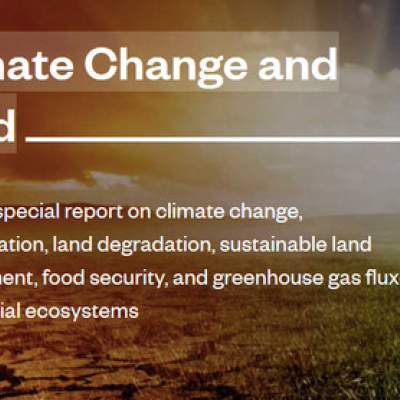The Intergovernmental Panel on Climate Change (IPCC) has today published a Special Report on Climate Change and Land. Prepared by 107 leading scientists from 52 countries across all regions of the world.
The report looks at desertification, land degradation, food security and their interactions with greenhouse gases and therefore climate change. The report finds that unless we rapidly change course on land use and farming, alongside reducing fossil fuel use, we will not be able to prevent the climate crisis.
In October 2018 the IPCC warned that the world has already passed one degree of warming as carbon emissions have grown massively alongside industrialisation and a growing population. They set out that the world is now completely off track, heading instead towards 3°C. This previous report explained that going past 1.5°C is dicing with the planet's liveability. They explained that we can stay below it - but it would require urgent, large-scale changes.
Global land and freshwater exploitation in recent decades are unprecedented

The latest report published today evidences that the rate and geographic extent of global land and freshwater exploitation in recent decades are unprecedented.
Climate change is projected to create extra stresses on land systems exacerbating existing risks related to desertification, land degradation and food security.
Agriculture, forestry and other land use activities account for 23% of total net anthropogenic emissions of GHGs.
The level of risk posed by future climate change will depend not only on the level of warming but how future population, consumption and land management patterns evolve.
Solutions are available and diversification of food is a big one

The report also shows solutions are available and should lead to a major and positive transformation in the way we manage land, support farmers fairly to produce diverse and low impact food and drive healthy and sustainable consumption patterns.
Multiple co-benefits are described including better health, enhanced livelihoods, poverty alleviation and nature and ecosystem protection. Mitigation approaches set out include reforestation, afforestation, large scale bioenergy and in the majority of cases bioenergy with carbon capture and storage.
It should be noted that the report is clear that these recommendations are global and should be treated within regional context considerations.
Unsurprisingly, more sustainable diets are on the agenda. For livestock, better grazing land management, improved manure management and higher-quality feed are all listed as part of the solution.
Diversification in the food system is considered a key strategy to reduce risks from climate change, by reducing GHG emissions and increasing resilience to climate change.
The report is clear that balanced diets, featuring plant-based foods, such as those based on coarse grains, legumes, fruits and vegetables, nuts and seeds, and animal-sourced food produced in resilient, sustainable and low-GHG emission systems, present major opportunities for adaptation and mitigation while generating significant co-benefits in terms of human health.
Eating Better is part of the solution
Eating Better has recently published ‘Better by half: A roadmap to less and better meat and dairy’ which provides 24 actions to be taken across 5 sectors to create an enabling environment to drive the necessary transformation in eating habits. If Government , food retail and services, investors and producers were to take these actions, this would make progress against the IPCC recommendations.
Through the roadmap we are calling for a 50% reduction in meat and dairy consumption by 2030, and a transition to 'better' meat and dairy as standard.
A transition to less and better meat and dairy will bring a host of benefits from reducing greenhouse gas emissions, freeing up land to support biodiversity and carbon sequestration, improve animal welfare and reduce antibiotic use, as well as improving our health.
